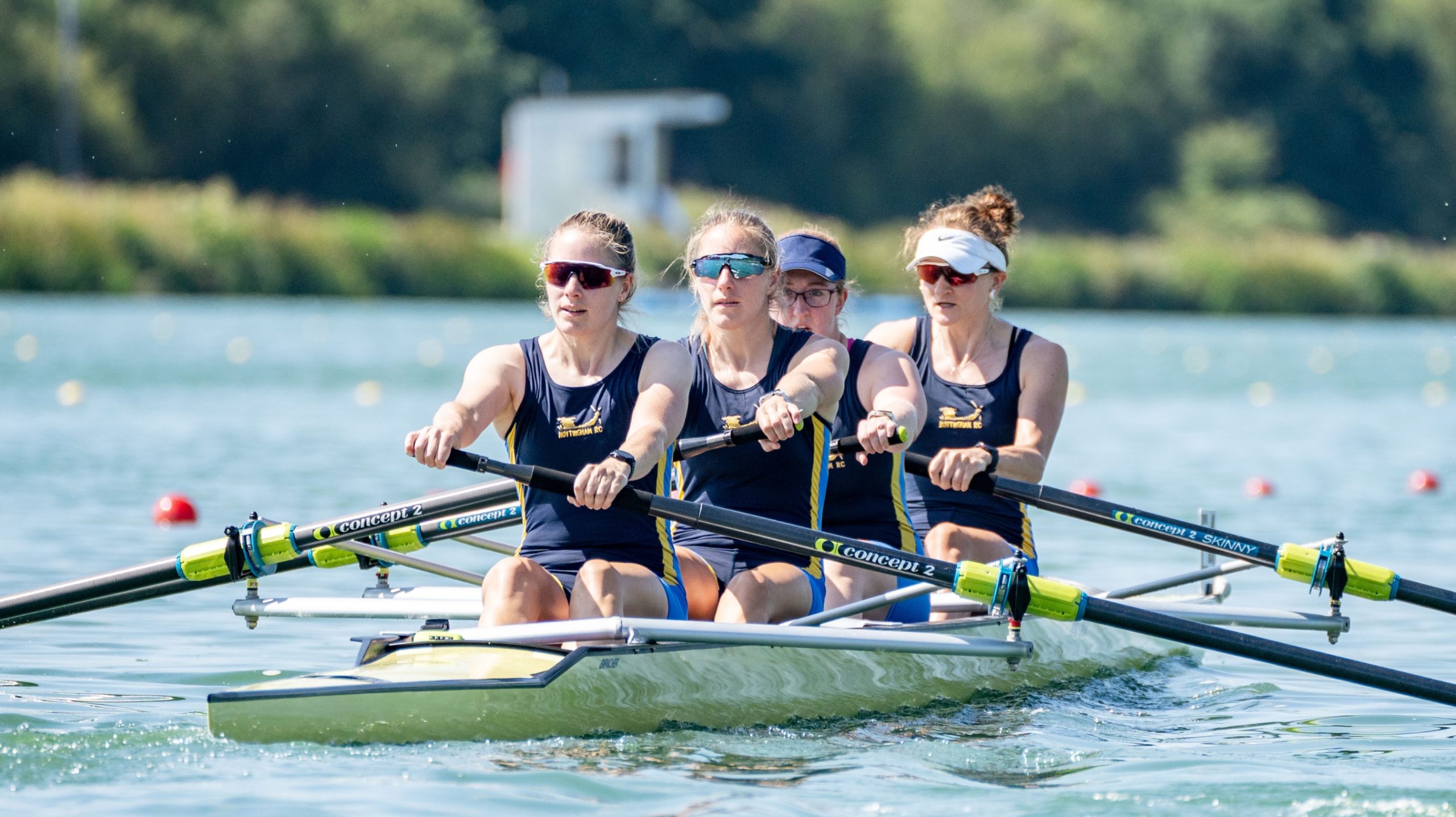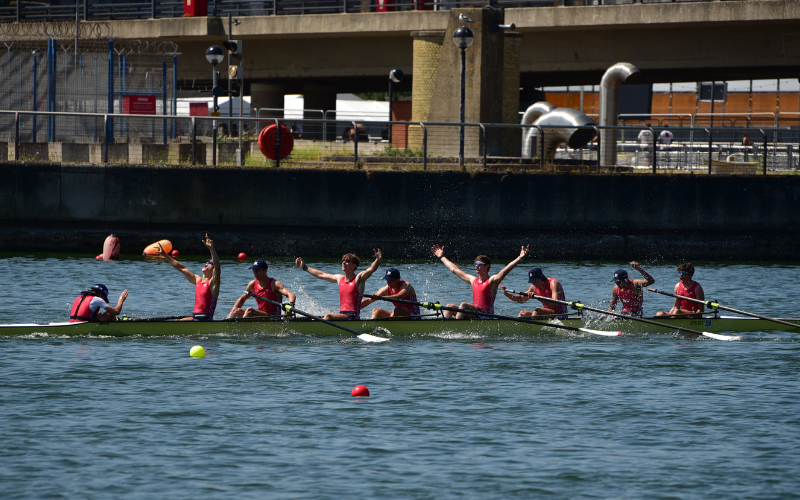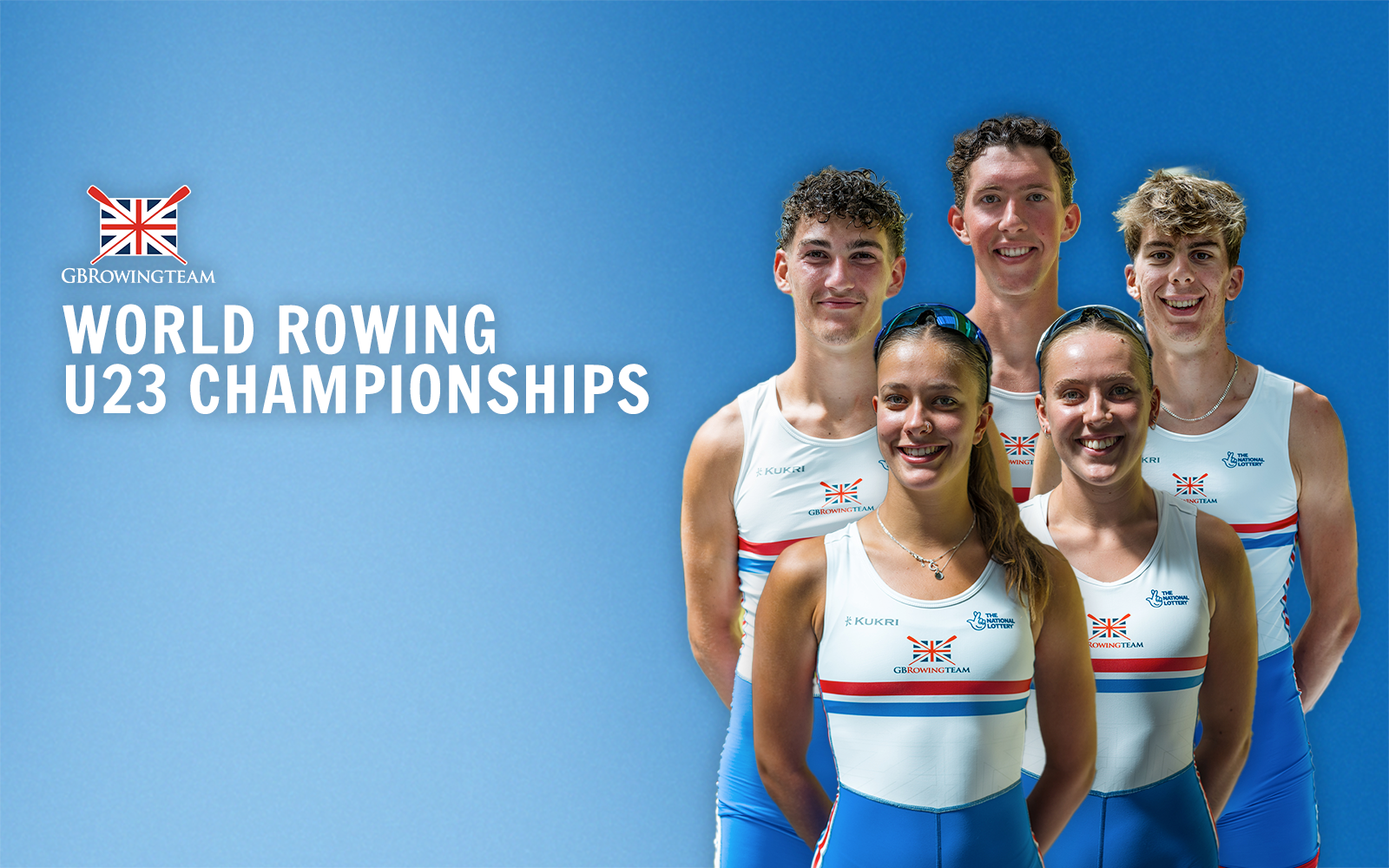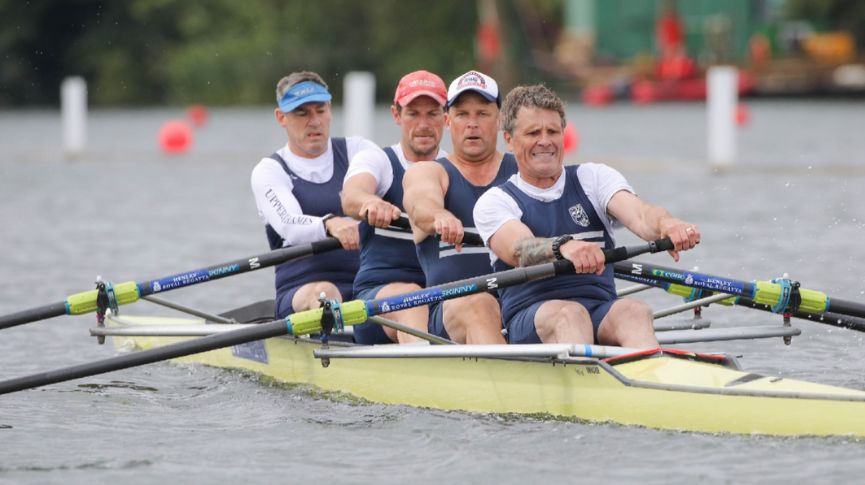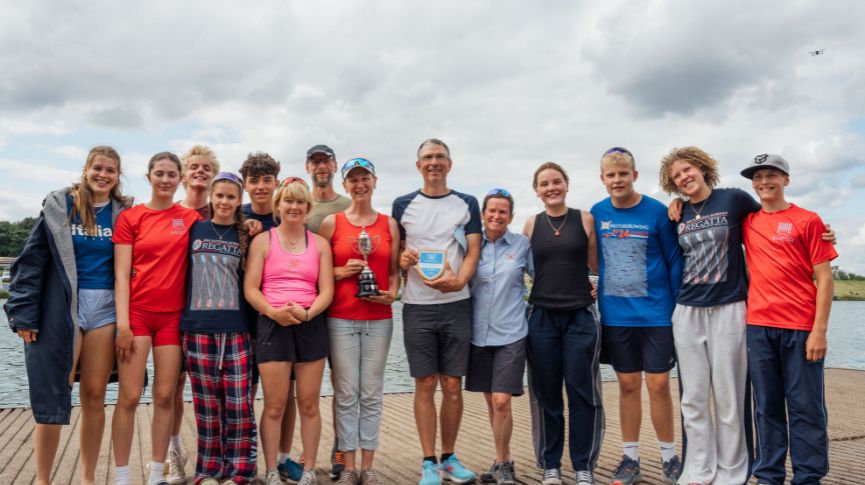More medals for GB on last day
GB finished the 2006 World Championships – sponsored by Siemens – with 5 medals – 3 in Olympic classes – after two days of tough and competitive final racing. There were a further 3 medals – 2 of them gold – in the adaptive classes, which was particularly encouraging with rowing making its debut at the 2008 Beijing Paralympics.
There was high drama in the closing stages of the regatta, with the GB women’s quad sculls – sponsored by Camelot – narrowly beaten to the gold medal by a determined Russian crew, who managed to find something extra after it looked for all the world that the GB quad had done enough to secure the race.
The race had followed a similar pattern to that of earlier races this season, with the Russians taking the early lead and GB sticking with them, before first getting back on terms and subsequently establishing a canvas lead. That was the way it stayed as the race entered the grandstand enclosures in the last 250m. But with the crowds shouting themselves hoarse in support of the home boat, the Russians dug deep and found enough in reserve to edge the race and take gold.
For Debbie Flood, Sarah Winckless, Frances Houghton and Katherine Grainger, second place will not have been something they will have contemplated and they fought all the way, but it was not to be enough. Sarah Winckless summed up the nature of the quad’s disappointment, "A few years ago I would have been happy with a World Championship silver, but now it’s not good enough, which I suppose shows how far we’ve come."
Elsewhere on the final day, GB’s adaptive squad showed great promise ahead of the Beijing Paralympics, with gold medals from Helene Raynsford in the women’s arms single sculls and in the coxed four. Shaun Sewell also registered a bronze in the men’s arms-only single sculls.
The final medal of the day came in the lightweight women’s quad sculls, where Laura Ralston, Lindsay Dick, Hester Goodsell and Sophie Hosking took bronze behind China and Denmark.
The weekend’s proceedings left David Tanner, GB Performance Director, feeling pleased, "Overall, I think that the GB team can be proud – we’ve had 9 finalists, in the Olympic classes, 4 finalists in the adaptive events and 2 gold medals today. While we didn’t quite achieve what we set out to do today, I think we’re on a good track for Beijing – we’ve had a good number of ‘A’ finalists. If there’s a challenge, it’s just to move more of those into the medal zone. Overall though, we’ve had a great Championships.
"I would like to pay a huge tribute to the volunteers and everyone else who has made this such a fantastic Championships. I’ve been a part of the organising committee and from all of our foreign guests I’ve had nothing but praise for the way this event has been delivered."
SUNDAY’S RACING IN FULL
With the hopes of the home crowd resting on their shoulders, GB’s women’s quad, the race got off to an even start with nothing separating all six crews. At the first marker, Russia led the GB quad – sponsored by Camelot – by a small margin as the two boats disputed the lead, with the Australians in contention. At halfway the Russians had increased the length of their lead to just under a second. But the GB boat traditionally turns on the power at this point and with 500m to go, they had just edged into the lead and began to push on. As the crowds in the enclosure came to life Katherine Grainger raised the rate again. But the Russians were not finished and in an immense finish, just edging the GB crew out on the line.
A disappointed Sarah Winckless summed up the feelings of the crew, "We came out to make a lot of people proud today and unfortunately we came up short of the mark. We didn’t do anything wrong, but the Russians were brilliant today. We’re very disappointed, but we’ll take that race with us every time we go on the water from now on."
China as expected made all the running from the start of the women’s light quad final. Starting towards the back of the pack, GB began to move back into contention for bronze behind the Danish crew in second. The order stayed unchanged with 500m to go with China having extracted a massive lead. The Danes held a length over GB in third, before a big push saw GB begin to pressure the Danes. In the end, it wasn’t quite enough and the GB crew had to settle for a well deserved bronze medal.
The final of the light women’s double sculls saw the Canadians lead off the start ahead of China, with Hall and Casey in the chasing pack. As pre-race hot favourites, China began to live up to the tag as they moved ahead to take control of proceedings. Australia moved to second place ahead of the Canadians at 750m. GB moved through to 4th towards the half way mark to stay in touch with proceedings.
At halfway China held a lead of half a length with Aus and Can still fighting it out for second and Hall and Casey hanging on the coattails of the race for medals. Hall and Casey wouldn’t give up the chase, but ultimately the three boats in the medal zone began to move away. There were to be no further surprises as far as the gold medal was concerned with the Chinese too strong for the rest of the field. Australia had to contend with a late push from the Greek double, but held on for silver, with the Canadians being pipped on the line for the bronze medal.
After an improved performance in the semi-final, GB’s lightweight men’s four started the race right in amongst the pack. There was nothing to separate the six lanes in the early stages. Ireland, France and China were the first to edge clear, with GB and Canada following. At halfway, China led from Ireland, with France and GB next past the marker. With 500m to go, the Canadians moved ahead of the GB crew, whilst Ireland and Canada fought it out for the gold. But the French weren’t done and raised their rate to make for a thrilling finish. In the end, the Chinese were too strong and took the gold by a comfortable margin from the photo-finish for silver which was just edged by the French with Ireland taking bronze. The GB four finished in 5th place.
The final of the men’s coxed four saw a battle for the lead in the early stages between New Zealand, Canada and Germany, with the GB crew towards the back of the pack. By halfway the German four had begun to make a move, passing Canada and threatening the Kiwis. With GB unable to close the gap, these three boats fought out the medal positions between them, with Germany taking gold ahead of the improving Canadians and the fading New Zealanders finishing third, with GB fifth.
Chris Bartley and Richard Chambers were unable to reproduce their form of earlier in the week in the final of the light men’s pair. By halfway the Germans had broken clear with Australia, Spain and Italy giving chase. When Australia faded the battle for silver was between Spain and Italy, with the former winning out. The GB crew ended the final in last place.
The light men’s quad sculls saw the GB make a quick start out of the blocks and heading the race after the first quarter. They were pursued by the Italian crew who took the lead just before the halfway mark. The GB boat faded in the third quarter of the race as the German and French boats gathered themselves for the finish. Despite a fast last 500m, the GB quad finished fourth behind the equally swift German and French outfits, with the Italians taking the gold medal by a comfortable margin.
The last race of the day and the 223 of the World Championships as a whole, also had GB interest in the shape of the men’s eight. The Germans were the first to show, but there wasn’t much in it in the early stages, with GB towards the back of the pack – as has been their strategy throughout the Championships. At the 750m mark, the Germans had 1/2 length on Italy, who had the same distance again on the USA and that was the way that things stayed past the halfway mark. The push from the GB eight that had been evident in earlier races this week, didn’t have the same effect today and the home team was unable to join the battle for medals. In the end the Germans took an unshakable lead and the gold medal, with the Italians moving through in the latter stages to take silver and USA bronze.
ADAPTIVE ACTION
After winning her heat on Friday, Helene Raynsford, will have been in confident mood ahead of today’s final. Raynsford was extremely quick off the mark and opened up an early lead of around a length on the rest of the field. By halfway, she had extended the lead further and the field was never able to close the gap, with Raynsford duly becoming World Champion.
"It was very hard work, but an amazing experience. I could hear my friends and family shouting "Go Helene" even though I blocked out most of the noise! At the start of June I missed 6 weeks of training after a car accident, so to make it here at all is miracle, but to become World Champion is just amazing."
The GB four took their place on the starting line as defending champions. After a false start, the race got off cleanly second time around. The GB crew got off to a quick start and edged ahead of the Dutch. They worked to increase the lead in the second quarter of the race, but the Dutch crew came back at them to head the race at the halfway mark. The GB boat then demonstrated its ability to change pace and took control with a devastating break, opening up 3/4 length lead as the race reached the grandstand enclosure. That proved to be the race winning break and GB took the gold from the Dutch with Canada third.
Shaun Sewell also made the rostrum following a tremendous scull in the arms only single event. Whilst no-one was ever going to catch runaway leader Dominic Monypenny, Sewell’s strength kept him in the hunt for medals and he eventually crossed the line in third place behind Moneypenny and Harvey of the USA.
Sewell was satisfied by his performance in the final, especially after Friday’s heat, "I was a bit complacent in the heat and relaxed too much. But with the benefit of a couple of extra day’s preparation, I managed to turn things around today."
Karen Cromie and James Roberts found the pace a bit too hot in the final of the trunk and arms double sculls today. With the USA double making all the running, the race became a procession behind them, with the Poles quickly establishing a cushion in second place and the Canadians pushing past the French late in the race to take bronze. The GB double ended in sixth place.
WORLD CHAMPIONSHIPS ETON, GREAT BRITAIN RESULTS DAY EIGHT (Races involving British crews only)
‘A’ FINALS
OPEN
WOMEN
Quad Sculls
1. Russia 6:11.99
2. Debbie Flood/Sarah Winckless/Frances Houghton/Katherine Grainger (GREAT BRITAIN) 6:12.50
3. Australia 6:13.99
4. Germany 6:14.67
5. China 6:18.57
6. USA 6:22.01
MEN
Coxed Four
1. Germany 6:05.77
2. Canada 6:06.47
3. New Zealand 6:07.37
4. USA 6:07.60
5. Simon Fieldhouse/Marcus Bateman/Tom Parker/Hugo Lee/Seb Pearce (GREAT BRITAIN) 6:07.98
6. Italy 6:13.45
Eight
1. Germany 5:21.85
2. Italy 5:23.29
3. USA 5:24.14
4. Austraila 5:29.91
5. Toby Garbett/Tom Solesbury/Jonno Devlin/Richard Egington/Josh West/Kieran West/Matt Langridge/Tom Stallard/Acer Nethercott (GREAT BRITAIN) 5:32.40
6. Poland 5:34.02
LIGHTWEIGHT
WOMEN
Double Sculls
1. Dongxiang Xu/Shimin Yan (China) 6:55.12
2. Marguerite Houston/Amber Halliday (Australia) 6:56.57
3. Chrysi Biskitzi/Alexandra Tsiavou (Greece) 6:57.14
4. Mara Jones/Tracy Cameron (Canada) 6:58.23
5. Jane Hall/Helen Casey (GREAT BRITAIN) 7:00.82
6. Sanna Sten/Minna Nieminen (Finland) 7:03.42
Quad Sculls
1. China 6:23.96
2. Denmark 6:28.16
3. Laura Ralston/Lindsay Dick/Hester Goodsell/Sophie Hosking (GREAT BRITAIN) 6:30.02
4. Germany 6:39.23
5. USA 6:40.86
6. Canada 6:46.38
MEN
Pair
1. Ole Rueckbrodt/Felix Otto (Germany) 6:28.41
2. Juan Manuel Florido Pellon/Jesus Gonzalez Alvarez (Spain) 6:30.17
3. Andrea Caianiello/Salvatore Di Somma (Italy) 6:30.64
4. Tim Smith/Cameron Wurf (Australia) 6:35.46
5. Mikhail Belikov/Sergey Bukreev (Russia) 6:35.65
6. Chris Bartley/Richard Chambers (GREAT BRITAIN) 6:39.59
Four
1. China 5:49.43
2. France 5:51.26
3. Ireland 5:51.35
4. Canada 5:53.13
5. Matt Beechey/Daniel Harte/Paul Mattick/James Clarke (GREAT BRITAIN) 5:58.02
6. Australia 5:58.80
Quad Sculls
1. Italy 5:53.83
2. Germany 5:55.37
3. France 5:57.42
4. Tim Male/Alisdair Leighton Crawford/Ross Hunter/Dave Currie (GREAT BRITAIN) 5:58.04
5. USA 6:09.93
B FINALS
WOMEN
Eight
1. New Zealand 6:10.48
2. Beth Rodford/Natasha Page/Vicki Eitebet/Carla Ashford/Natasha Howard/Alison Knowles/Katie Greves/Elise Laverick/Caroline O’Connor (GREAT BRITAIN) 6:10.98
3. Russia 6:13.67
4. France 6:15.93
5. Belarus 6:16.67
6. Ukraine 6:20.62
MEN
Lightweight Double Sculls
1. Takahiro Suda/Daisaku Takeda (Japan) 6:14.12
2. James Lindsay-Fynn/Mark Hunter (GREAT BRITAIN)
3. Vasileios Polymeros/Dimitrios Mougios (Greece) 6:17.06
4. Zsolt Hirling/Tamas Varga (Hungary) 6:18.00
5. Juliusz Madecki/Sebastian Sageder (Austria) 6:20.80
6. Matt Jensen/Douglas Vandor (Canada) 6:25.00
ADAPTIVE
Women’s Arms Single Sculls Final
1. Helene Raynsford (GREAT BRITAIN) 6:14.87
2. Patricia Rollison (USA) 6:23.10
3. Martina Snopek (Poland) 6:25.67
4. Shira Golden (Canada) 6:25.78
5. Agnese Moro (Italy) 6:32.57
6. Marie-Pierre Baskevitch-Six (France) 7:04.38
Men’s Arms Single Sculls Final
1. Dominic Monypenny (Australia) 5:28.87
2. Ron Harvey (USA) 5:41.83
3. Shaun Sewell (GREAT BRITAIN) 5:55.23
4. Jeff Standfield (Canada) 5:56.85
5. Pierre Paugam (France) 6:01.81
6. Simone Miramonti (Italy) 6:05.29
Trunk and Arms Double Sculls
1. Scott Brown/Angela Madsen (USA) 4:20.50
2. Yolanta Pawlak/Piotr Majka (Poland) 4:24.19
3. Caitlin Renneson/Wilfredo More Wilson (Canada) 4:30.86
4. Christophe Somme/Jessie Malotaux (France) 4:31.66
5. Konstantina Garatsa/Athnasios Kotsis (Greece) 4:34.58
6. Karen Cromie/James Roberts (GREAT BRITAIN) 4:36.55
Legs, Trunk and Arms Mixed Coxed Four
1. Naomi Riches/Victoria Hansford/Alastair Mckean/Alan Crowther/Alan Sherman (GREAT BRITAIN) 3:28.21
2. Holland 3:32.62
3. Canada 3:35.19
4. Australia 3:35.92
5. USA 3:36.83
6. Italy 3:46.33


